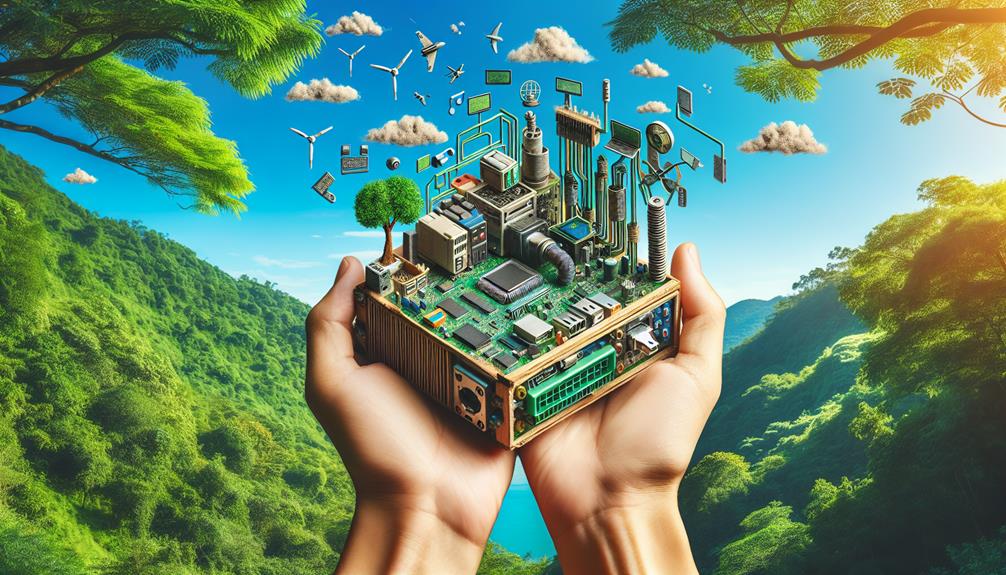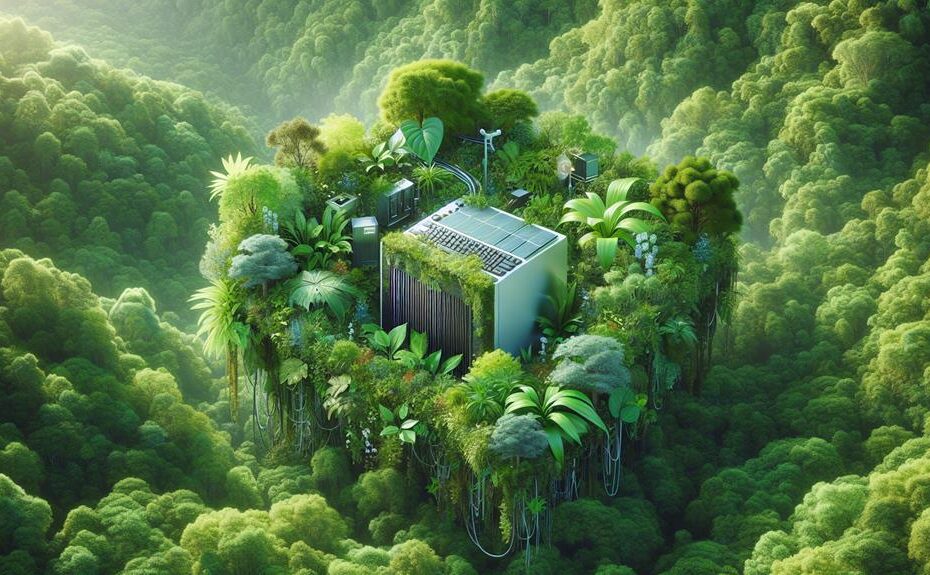



By choosing mini PCs, you'll save energy and help the environment. These compact devices are designed to be power-efficient, reducing electricity usage and lowering bills. They're also easier to upgrade and repair, leading to less electronic waste. Mini PCs have a smaller carbon footprint, emitting fewer greenhouse gases. Sustainable manufacturing practices and eco-friendly materials are used, reducing environmental impact. Opting for mini PCs promotes a greener IT infrastructure. Learn more about the environmental benefits and advantages of using mini PCs.
Key Takeaways
- Mini PCs consume less energy, reducing electricity bills and environmental impact.
- Upgradable and repairable design minimizes electronic waste generation.
- Sustainable manufacturing practices and eco-friendly materials decrease environmental harm.
- Lower carbon footprint due to reduced energy consumption and use of renewable resources.
- Mini PCs play a vital role in green computing initiatives, aligning with sustainability objectives.
Energy Efficiency
When considering energy efficiency, mini PCs outperform traditional desktop computers by consuming much less power during operation. Mini PCs are designed to be power-efficient, with lower power consumption rates compared to standard desktops. This reduced power consumption not only saves you money on electricity bills but also contributes to a greener environment by decreasing overall energy usage.
Additionally, mini PCs excel in thermal management. Due to their compact size and efficient design, mini PCs generate less heat during operation. This is beneficial not only for the longevity of the device but also for maintaining a cooler and more comfortable environment in your workspace. By producing less heat, mini PCs reduce the need for additional cooling solutions such as fans or cooling pads, further decreasing energy consumption.
Reduced Electronic Waste
To minimize electronic waste, opting for mini PCs over traditional desktop computers presents a sustainable solution with lasting environmental benefits. Mini PCs are designed with components that are often more easily upgradable and repairable compared to larger desktop computers. This means that when a part becomes outdated or faulty, you can replace that specific component rather than discarding the entire machine, reducing the amount of electronic waste generated.
Moreover, many mini PC manufacturers offer recycling programs for their products, ensuring that when your mini PC reaches the end of its life cycle, it can be properly disposed of or recycled. This proactive approach to e-waste management helps prevent these devices from ending up in landfills where they can leach harmful chemicals into the environment.
Lower Carbon Footprint

Choosing mini PCs instead of traditional desktop computers can greatly decrease your carbon footprint because of their energy-efficient design and lower power consumption. Mini PCs are designed to consume less energy while providing the same level of performance as larger desktop computers. This results in a significant reduction in greenhouse gas emissions and energy usage over time. By utilizing renewable energy sources to power your mini PC, such as solar or wind power, you can further decrease your carbon footprint and promote sustainability.
In addition to using renewable energy, mini PCs contribute to emissions reduction by requiring fewer materials to manufacture, reducing the environmental impact of production processes. Their smaller size and lower power requirements also lead to decreased energy consumption during use, further lowering emissions. Overall, adopting mini PCs as part of your computing setup not only benefits you with efficiency and space-saving but also positively impacts the environment by lowering your carbon footprint and promoting the use of renewable energy sources.
Sustainable Manufacturing Practices
Emphasizing sustainable manufacturing practices in the production of mini PCs can greatly reduce environmental impact and enhance overall sustainability. By utilizing renewable resources and implementing green manufacturing techniques, the mini PC industry can make significant strides towards reducing its carbon footprint.
Green manufacturing involves designing products with the environment in mind, from the selection of materials to the manufacturing processes. This approach minimizes waste, reduces energy consumption, and lowers emissions. By incorporating renewable resources like bamboo or recycled plastics into the production of mini PCs, manufacturers can decrease their reliance on non-renewable materials and decrease the environmental impact of their operations.
Implementing sustainable manufacturing practices not only benefits the environment but also creates a positive image for companies in the eyes of consumers. As the demand for eco-friendly products continues to rise, companies that prioritize green manufacturing will likely see increased customer loyalty and market share. Integrating renewable resources and green manufacturing techniques into the production of mini PCs is an essential step towards a more sustainable future.
Eco-Friendly Materials

By integrating eco-friendly materials like biodegradable plastics and sustainably sourced metals, the mini PC industry can further reduce its environmental impact and promote a more sustainable production process. Utilizing renewable resources such as bamboo or recycled plastics in the manufacturing of mini PCs can greatly decrease the carbon footprint associated with the production of these devices. Biodegradable components not only lessen the environmental impact during disposal but also reduce the reliance on non-renewable resources. Sustainably sourced metals like aluminum from recycled materials or responsibly mined sources can help minimize the environmental degradation caused by mining activities. These materials not only support a circular economy but also contribute to the conservation of natural resources.
Incorporating renewable resources and biodegradable components into mini PC production aligns with the industry's shift towards more eco-friendly practices. Manufacturers can leverage these materials to create products that are not only energy-efficient but also environmentally conscious from cradle to grave. By prioritizing the use of eco-friendly materials, the mini PC sector can take significant steps towards a more sustainable future.
Extended Product Lifespan
Extending the lifespan of mini PCs can greatly reduce electronic waste and contribute to a more sustainable computing ecosystem. By implementing eco-friendly maintenance practices and prioritizing resource conservation, you can have a substantial impact on the environmental benefits of using these compact devices. Mini PCs are designed for longevity, with many manufacturers focusing on durable components and efficient cooling systems to guarantee extended use. Regular maintenance, such as cleaning internal components and updating software, not only prolongs the lifespan of the device but also reduces energy consumption and minimizes the need for replacements.
Opting for mini PCs with upgradable features further enhances their lifespan, allowing you to adapt to changing technological requirements without discarding the entire system. Additionally, choosing to repair or upgrade components instead of replacing the entire unit promotes a circular economy model, reducing overall electronic waste. By prioritizing eco-friendly maintenance practices and resource conservation, you can actively contribute to a more sustainable computing environment while enjoying the benefits of mini PCs for an extended period.
Space-Saving Design

To maximize the utility of mini PCs and optimize space efficiency, their compact and space-saving design is a key feature that enhances their practicality for various computing environments. Mini PCs offer a compelling solution for those looking to save space without compromising on performance. With a compact performance that rivals traditional desktop computers, these devices pack a punch in a minimalist footprint. The sleek and small form factor of mini PCs allows them to fit seamlessly into diverse settings, such as offices, living rooms, or even educational institutions where space is at a premium. By utilizing mini PCs with their space-saving design, you not only declutter your workspace but also contribute to a more organized and efficient computing environment. Whether for work or play, the compact performance and minimalist footprint of mini PCs make them a versatile and practical choice for individuals and businesses alike looking to optimize their space utilization without sacrificing functionality.
Disclosure: As an Amazon Associate, I earn from qualifying purchases.




